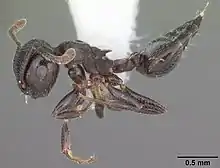Crematogaster ashmeadi
Crematogaster ashmeadi, commonly known as the acrobat ant, is an arboreal ant widespread in the Southeastern United States. It nests and forages almost exclusively above ground level, often found in treetops and on lianas. It is one of eleven species in the genus Crematogaster that is native to eastern North America. This ant species has been observed to raid wasp nests, including the species Mischocyttarus mexicanus, and to forage on their brood.[2] It is the most dominant arboreal ant in the pine forests of the coastal plains of northern Florida.[3] Colonies of these ants inhabit a majority of pine trees in the area, living in chambers in the outer bark of living trees that have been abandoned by bark-mining caterpillars, usually of the family Cossidae. C. ashmeadi does little to no excavation of its own, relying solely on chambers bored out by other insects.[3]
| Crematogaster ashmeadi | |
|---|---|
 | |
| Crematogaster ashmeadi worker | |
| Scientific classification | |
| Domain: | Eukaryota |
| Kingdom: | Animalia |
| Phylum: | Arthropoda |
| Class: | Insecta |
| Order: | Hymenoptera |
| Family: | Formicidae |
| Subfamily: | Myrmicinae |
| Genus: | Crematogaster |
| Species: | C. ashmeadi |
| Binomial name | |
| Crematogaster ashmeadi | |
References
- "Crematogaster ashmeadi". Integrated Taxonomic Information System.
- Clouse, R. M. (1995). "Nest usurpation and intercolonial cannibalism in Mischocyttarus mexicanus (Hymenoptera: Vespidae)". Journal of the Kansas Entomological Society. 68 (1): 67–73. JSTOR 25085561.
- Tschinkel, Walter R. (2002-07-12). "The natural history of the arboreal ant, Crematogaster ashmeadi". Journal of Insect Science. 2 (12): 12. doi:10.1093/jis/2.1.12. PMC 355912. PMID 15455046.
External links
 Media related to Crematogaster ashmeadi at Wikimedia Commons
Media related to Crematogaster ashmeadi at Wikimedia Commons- "Species: Crematogaster ashmeadi". The California Academy of Sciences. 2008. Retrieved 2008-12-27.